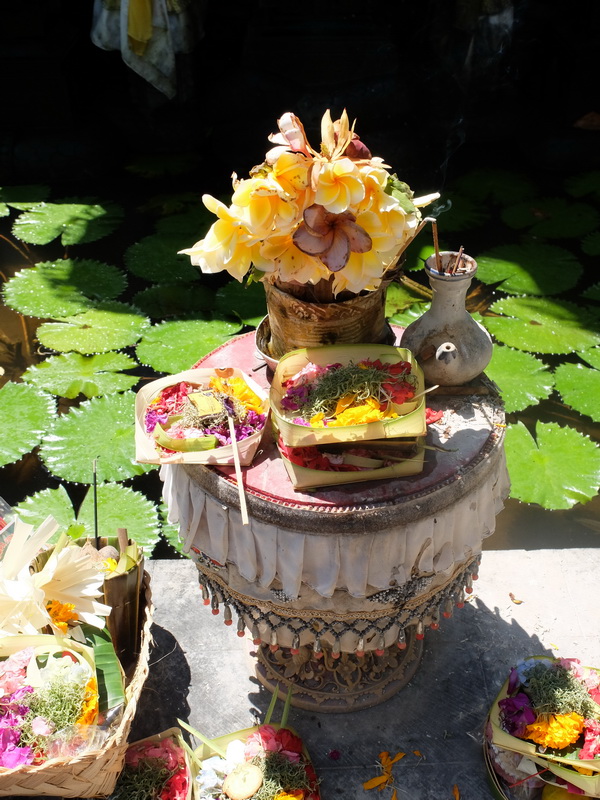 Celebrated every 210 days during the 210 day Pawukon Calendar, Buda Wage Klawu also know as Buda Cemeng Klawu is one of the important Hindu holidays recognized in Bali. In this tradition “Bhatara Rambut Sedana” honours the “Goddess of Prosperity”, who brings wealth and fortune to humans. It is often referred to as “Piodalan Ida Batara Sri Sedana”.
Celebrated every 210 days during the 210 day Pawukon Calendar, Buda Wage Klawu also know as Buda Cemeng Klawu is one of the important Hindu holidays recognized in Bali. In this tradition “Bhatara Rambut Sedana” honours the “Goddess of Prosperity”, who brings wealth and fortune to humans. It is often referred to as “Piodalan Ida Batara Sri Sedana”.
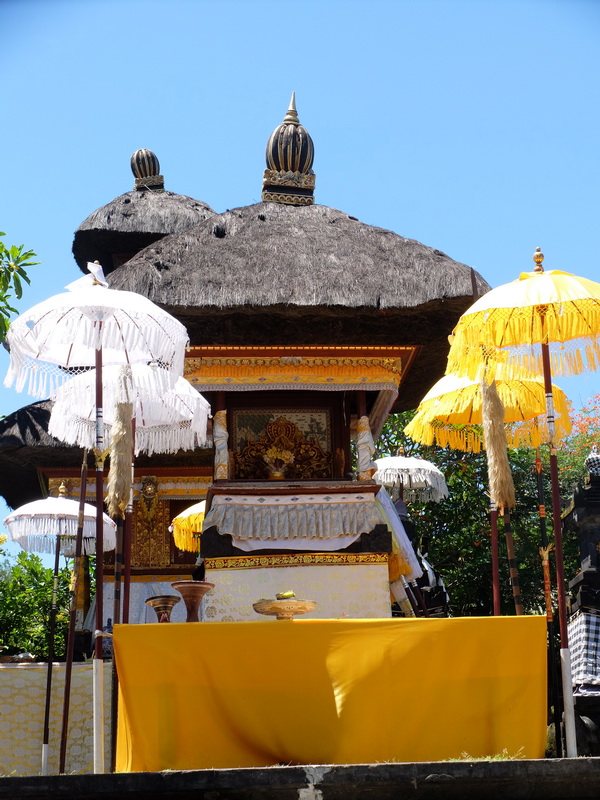 Ceremonies take place in domestic environments, business premises as well as Temples across Bali. This particular holiday is mainly observed by businesses such as market traders, shop owners, restaurants and financial institutions. Special offerings are given to honor Ida Batara Sedana the “Goddess of Prosperity” as a form of gratitude for his blessings. On this day the Hindu people of Bali are not supposed to use money to purchase items in the form of goods, or to pay debts either as they believe that this money will be lost forever.
Ceremonies take place in domestic environments, business premises as well as Temples across Bali. This particular holiday is mainly observed by businesses such as market traders, shop owners, restaurants and financial institutions. Special offerings are given to honor Ida Batara Sedana the “Goddess of Prosperity” as a form of gratitude for his blessings. On this day the Hindu people of Bali are not supposed to use money to purchase items in the form of goods, or to pay debts either as they believe that this money will be lost forever.
In Hindu literature it is understood that money is essentially a means not the purpose of life, depending on how we choose to use it. If we utilize money appropriately based on the concept of God it leads to a happy physical and spiritual life. If money is considered the most important thing in life, the local belief is this will bring misery. Therefore the idea is to use the money as a means of realizing the Dharma / truth / goodness. “Following one’s dharma means not only remaining ethical but also assuming the duties that are proper to the class or society we are born into (due to one’s past karma), and to the stage of life we are presently in.”
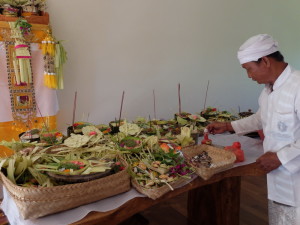 On the 15th April, 2014 Teak Bali held its own ceremony at our corporate offices on Jalan Nakula Timur. All the staff were dressed in traditional Balinese dress, including Batik Kamben (cloth), men with Udeng (headress). The office was filled with offerings and incense sticks and the upstairs area was arranged for us to sit or kneel together in front of the Pelangkiran (shrine) where we had the ceremony conducted by Gung Aji, a local Pemangku (Priest) from the Pura Luhur Candi Narmada Temple (Jalan By Pass Ngurah Rai, Badung). We started with prayer following the “Mantra Muspa”, which translates to prayer by means of Sekar (flowers). There are 5 stages of worship, essentially pray with empty hands, pray with flower in hand 3 times and then pray empty hand. Women place the flowers in their hair after each prayer.
On the 15th April, 2014 Teak Bali held its own ceremony at our corporate offices on Jalan Nakula Timur. All the staff were dressed in traditional Balinese dress, including Batik Kamben (cloth), men with Udeng (headress). The office was filled with offerings and incense sticks and the upstairs area was arranged for us to sit or kneel together in front of the Pelangkiran (shrine) where we had the ceremony conducted by Gung Aji, a local Pemangku (Priest) from the Pura Luhur Candi Narmada Temple (Jalan By Pass Ngurah Rai, Badung). We started with prayer following the “Mantra Muspa”, which translates to prayer by means of Sekar (flowers). There are 5 stages of worship, essentially pray with empty hands, pray with flower in hand 3 times and then pray empty hand. Women place the flowers in their hair after each prayer.
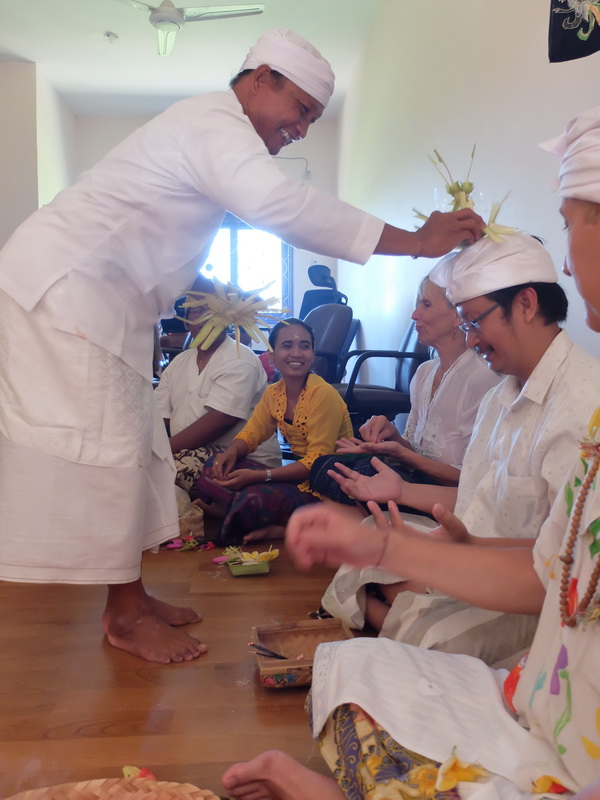 The ceremony then followed the usual Balinese traditions, incense sticks lit to cleanse and purify the body and spirits. Further purification occurs by sprinkling and drinking of blessed water obtained from the Beji (place of Holy spring water) at the Pura Luhur Temple. We were then given what is referred to as Melukat “holy shower” in which the water is poured onto our heads and over our bodies. Rice is then placed on our forehead, temples and chest for good fortune and prosperity, also three grains of the rice were consumed. The Pemangku then positioned a piece of white thread on our heads which signifies purity and strength. The ceremony finishes by eating small portions of the food in the offerings (fruit, crisps, cake) which is for a happy and prosperous future.
The ceremony then followed the usual Balinese traditions, incense sticks lit to cleanse and purify the body and spirits. Further purification occurs by sprinkling and drinking of blessed water obtained from the Beji (place of Holy spring water) at the Pura Luhur Temple. We were then given what is referred to as Melukat “holy shower” in which the water is poured onto our heads and over our bodies. Rice is then placed on our forehead, temples and chest for good fortune and prosperity, also three grains of the rice were consumed. The Pemangku then positioned a piece of white thread on our heads which signifies purity and strength. The ceremony finishes by eating small portions of the food in the offerings (fruit, crisps, cake) which is for a happy and prosperous future.
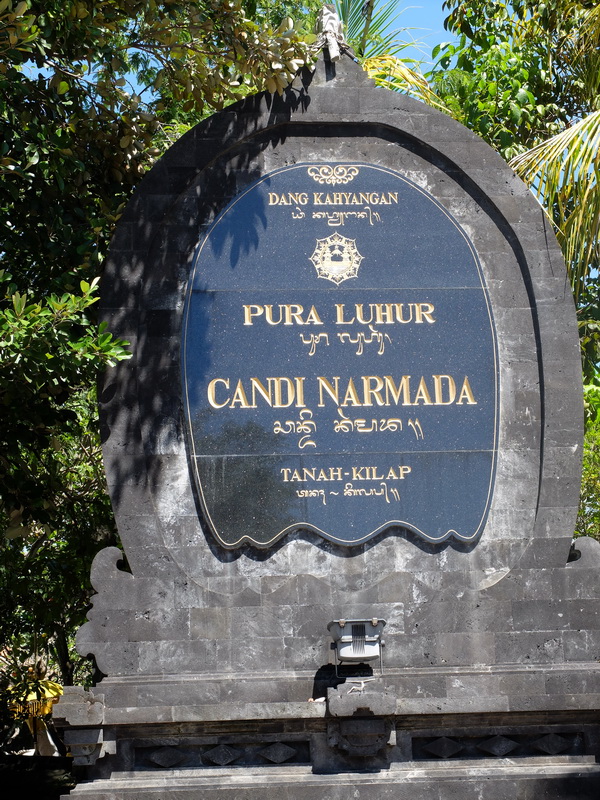 After the ceremony held at Teak Bali, we then traveled to the Pura Luhur Candi Narmada Temple where we went through a further three stages of ceremony at different temples within the compound essentially following same process as before.
After the ceremony held at Teak Bali, we then traveled to the Pura Luhur Candi Narmada Temple where we went through a further three stages of ceremony at different temples within the compound essentially following same process as before. 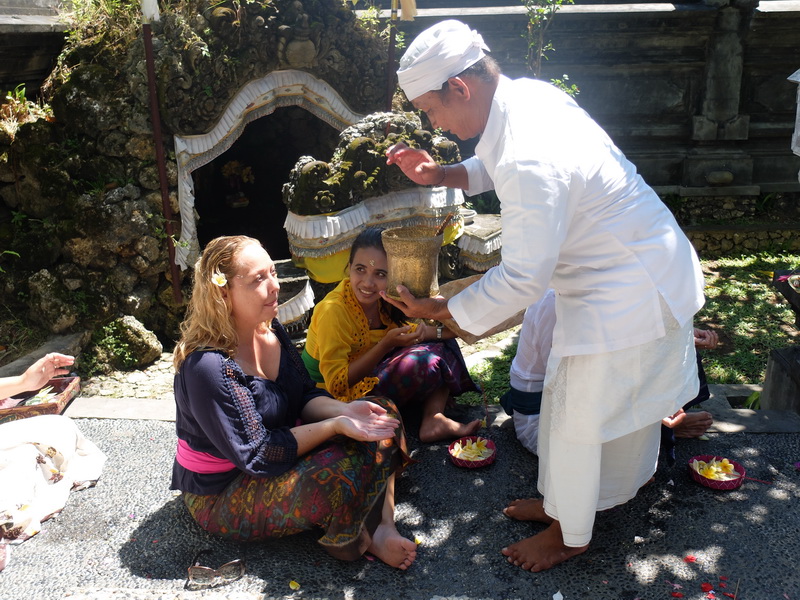 The first was at the Beji, which represents cleansing and purification of the body, so again given a “holy shower” followed by the Mantra Muspa prayer. The Pemangku then tied plaited thread to our right wrists. This thread is known as Tri Datu “The three colours” red, white and black, each color has its own connection to one of the 3 main manifestations of the godhead – Brahma (the creator), Visnu (the preserver) and Shiva (the destroyer). The Tri Datu is meant to calm the mind of negative thoughts and provide us with power, strength and longevity.
The first was at the Beji, which represents cleansing and purification of the body, so again given a “holy shower” followed by the Mantra Muspa prayer. The Pemangku then tied plaited thread to our right wrists. This thread is known as Tri Datu “The three colours” red, white and black, each color has its own connection to one of the 3 main manifestations of the godhead – Brahma (the creator), Visnu (the preserver) and Shiva (the destroyer). The Tri Datu is meant to calm the mind of negative thoughts and provide us with power, strength and longevity.
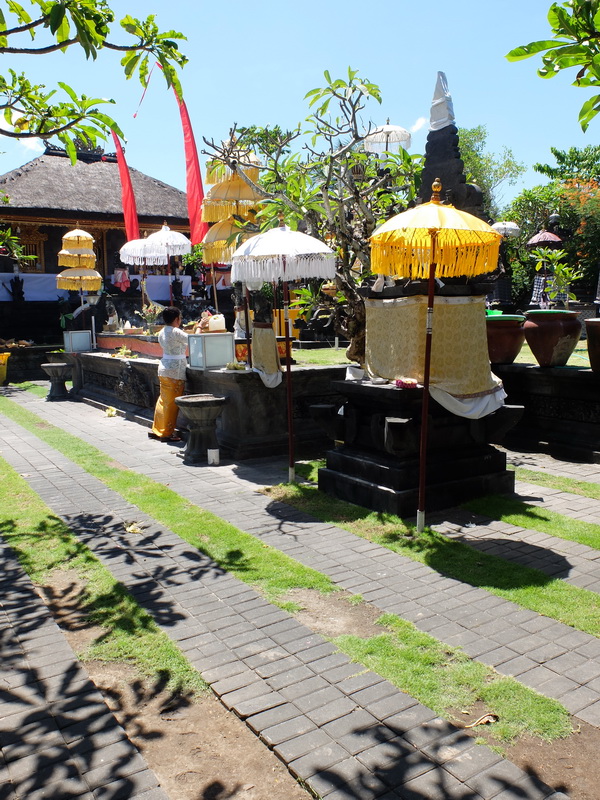 The next stage of the ceremony was prayer at the Ratu Gede Temple, this temple people go to prayer for protection for themselves and family. The last stage was at the main Pura Luhur Candi Narmada Temple which we prayer here for our wealth and prosperity. Teak Bali staff attend the Buda Wage Klawu ceremony at this important Balinese Hindu temple every 210 days. Some members of the Teak Bali staff also attend full moon “Purnama” ceremony at this lovely and important Hindu temple with the aid of Gung Aji who is responsible for maintaining the Beji temple within the Candi Narmada compound.
The next stage of the ceremony was prayer at the Ratu Gede Temple, this temple people go to prayer for protection for themselves and family. The last stage was at the main Pura Luhur Candi Narmada Temple which we prayer here for our wealth and prosperity. Teak Bali staff attend the Buda Wage Klawu ceremony at this important Balinese Hindu temple every 210 days. Some members of the Teak Bali staff also attend full moon “Purnama” ceremony at this lovely and important Hindu temple with the aid of Gung Aji who is responsible for maintaining the Beji temple within the Candi Narmada compound.
